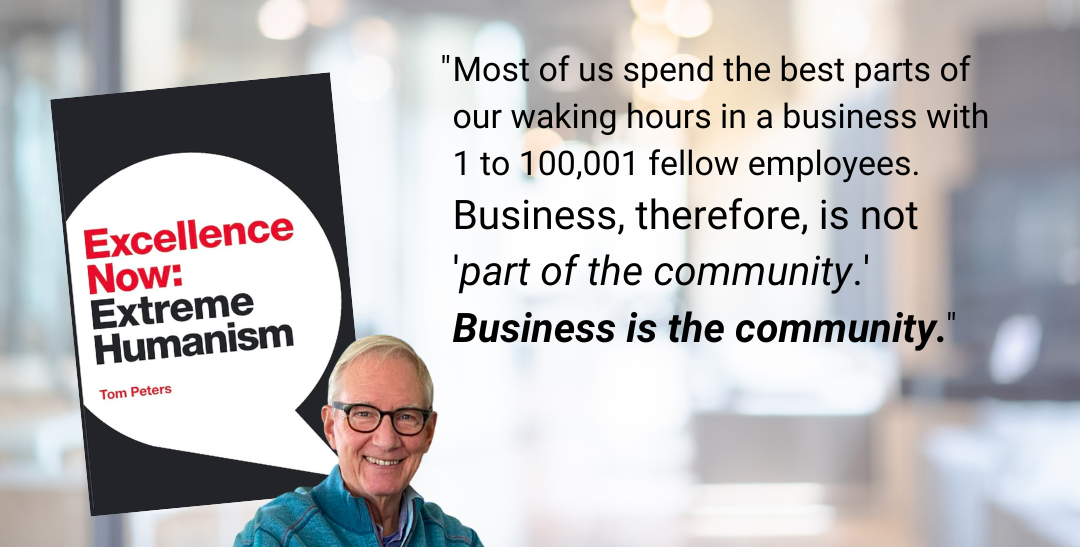The toughest person you will ever lead is yourself. You can’t effectively lead others unless you can lead yourself.
According to the book Extreme Humanism by Tom Peters:
The Culture Mandates
- Culture comes first
- Culture is exceedingly difficult to change
- Culture change cannot be/must not be evaded or avoided
- Culture maintenance is about as difficult as culture change
- Culture change/maintenance must become a conscious/permanent/ personal agenda item
- Culture change/maintenance is manifest in “the little things” far more than the big things
I’m not much for dogma. Cannabis is a space where “new ways” can and should find footing and where “old ways” can be recalibrated and improved upon. Classical business methods feel dated, but they are also instructive and accessible. So, naturally, we try to find ways in which we can incorporate the old-old with the new-new. The time and pace of the space demand our full and immediate attention. So we must compromise by implementing the methods of the past in hopes that this new business paradigm will fix the past despite its appearance.
On rare occasions, I come across a book where “it just fits.” Tom Peter’s Extreme Humanism is a book that I’ve come to realize may very well be the perfect encapsulation of what being in business is all about (spoiler: it’s to help one another). Great business related books make you question not just the space you inhabit but also the person you are within it. So, for this article, I am going to focus on how culture shows us who we are in the space, what we should want for one another, and most importantly, how to reconcile a malfunctioning, malformed, or broken culture code via five easily digestible vignettes you can scroll through quickly so you don’t hurt your attention span.

With that, let’s once again break through the fourth wall and remind readers who works within these companies, not what they are selling or dispensing. Forgetting real people that inhabit real roles and only focusing on the commercial implications for their own sake is the perfect signature necessary to not care about culture. The who is just like the rest of the American landscape. It is mothers and fathers, sons and daughters, many with young mouths to feed, myself included. They send money home, they worship, they buy imitation branded products, they go to night school, and they can’t afford to get sick.
If companies center humans in their plans, they should ask: What do we want for them? What do we want for them in their job? Culture technically should provide the answer: to get every ounce of self-respect and satisfaction, every dollar coming to them for their time and labor, and every chance to move up in role and responsibility. The result is a future in which they can have as much happiness as possible during their lifetime. Romantic? Yes. Business-centric? No, and that’s the problem, because it should be.
Here are five ways to bring the color back to your culture
1. Give-a-shit-ism
General Melvin Zais when addressing the US Army War College senior officers had an absolutely brilliant quote provided via Extreme Humanism: “The one piece of advice which will contribute to making you a better leader, will provide you with greater happiness, and will advance your career more than any other advice…and it doesn’t call for a special personality or any certain chemistry…and anyone can do it, and it’s this: You must care.”
As a cannabis business, no one can have a single iota of waste. We can’t afford it. But how does a business ensure that objective? By providing care and thought to everyone within the organization. The reciprocal actions of care are attention, thoughtfulness, and communication. Want to ensure your company is on the up? Care for your people so they can care for the business.

2. Avoid the speed trap
Slow down. All the important stuff (relationships, deals, etc.) takes a lot of time.
This is a partial list of strategic activities that underpin both personal and organizational success and excellence. And they cannot be accomplished in a flash.
- Building and maintaining relationships
- Recruiting allies and talent for your cause
- Building/maintaining a high performance culture
- Reading/studying
- Fierce/aggressive listening
Time is an elusive luxury in cannabis, but it pays, fiscally and culturally, to stop amidst the brouhaha and the hubbub and truly look at how your culture is morphing, changing, diminishing, etc. If you can create, find, or discuss a mantra (e.g., Apple’s “Think Different”) and focus on taking time to focus on how you are doing your work, you’ll stave off some of the worst elements of companies ignoring culture in favor of growth; attrition, and low morale.
3. Apology works, apology pays
Given the turbulence common in cannabis businesses, a great way to head off a first-order fisaco is with an apology when something has gone sideways. It’s an enterprise cultural trait to own a mistake or a misstep among colleagues and collaborators. It’s raw and it’s real, both of which are sadly abhorrent to the business setting in most people’s minds. Forget that. Cannabis workers can’t afford to have miscommunication/issues linger, and trust is the first thing to go when personal pride overrules all.
Apologies are a form of integrity. Integrity breeds trust in communication and intent. Communication and intent, when aligned, lead to longer standing and lasting relationships and collaborations. Long and productive tenure at businesses adds value and keeps attrition low, with training and skill development being progressively improved upon.
4. Self-knowledge = leadership strength #1
Being conscious of your own behavior and the impact it has on people around you is vital. There has to be a willingness to examine what behaviors of your own may be getting in the way. The toughest person you will ever lead is yourself. You can’t effectively lead others unless you can lead yourself. It’s beneficial to be brilliant beyond measure both intellectually and analytically, but being a total dunce when it comes to understanding others and how they relate to you will only take you so far.
5. Culture maintenance is a full-time job
Business is embedded in the community. Being a good neighbor is a profitable way to run a business, and it is the right thing to do. But it’s not about having a good culture; it’s about maintaining it. If you’re lucky, you will add new people, new markets, and, by virtue of both, new communities. Culture’s morph; they don’t necessarily change, and it falls to everyone in the C-suite to have top-down messaging for the bottom-up to hold the middle.
Like the above? Curious to find out more? Click here to see our cultural roadmap and learn more ways to improve company culture.
Curious to learn more? Email me: Mike@flowerhire.com, all are welcome.

Mike Siebold is a strategic advisor and investor to several cannabis teams domestically. His exposure to the hiring demand and movement of people within the cannabis industry gives him a unique perspective on the prospects and viability of players across the entire ecosystem.


